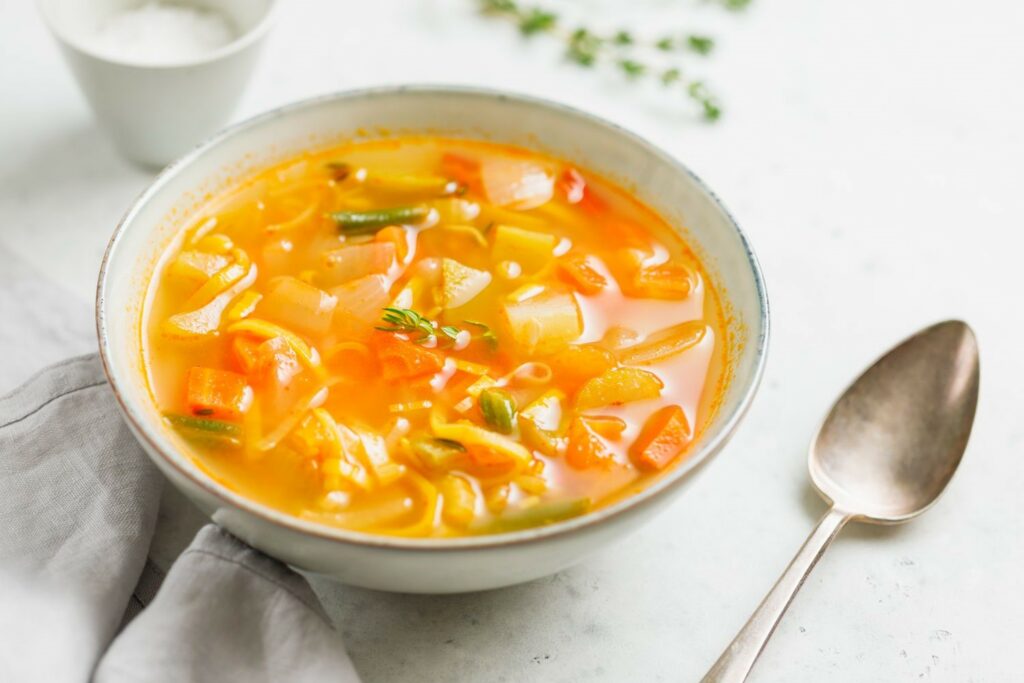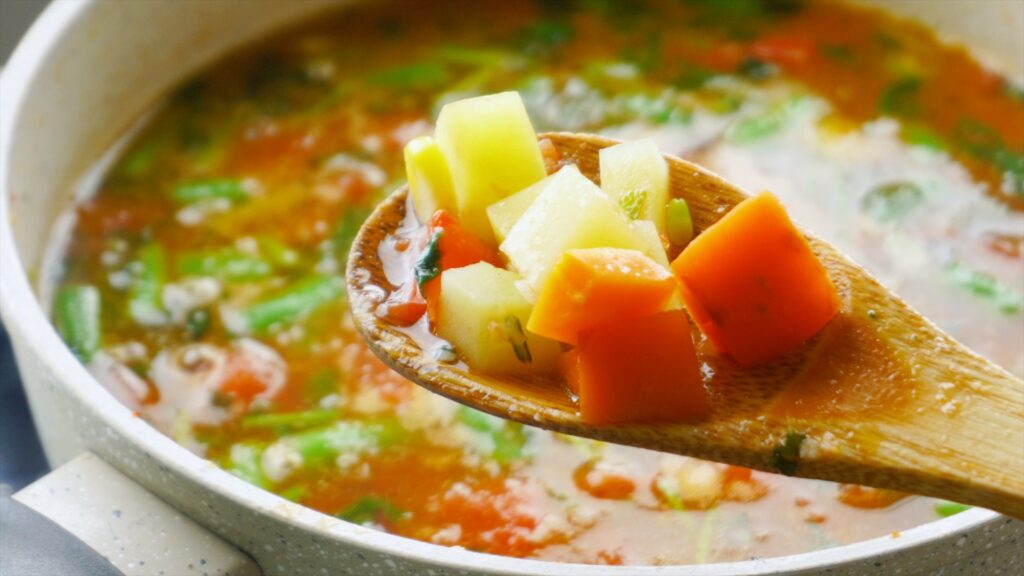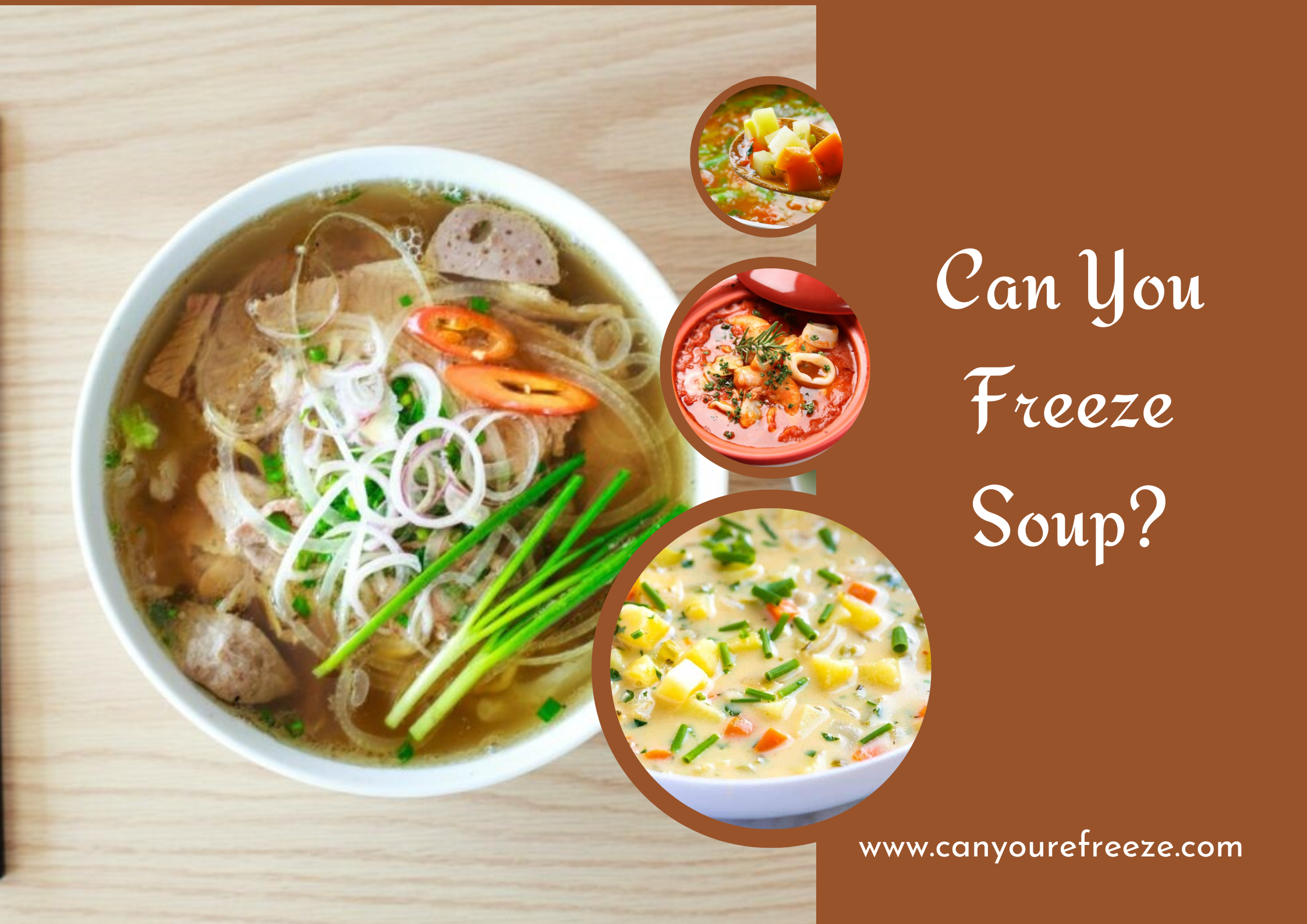Can You Freeze Soup?
Soups are the best meals all year round. Even if you are sick or perfectly wealthy soups are a lightweight healthy meal to consume. Check out this blog to follow some easy steps on ways to freeze soup.

Usually, we tend to eat soup as a starter before a meal. However, there’s nothing wrong with eating it as a meal. Soups are well-cooked or brewed with surprisingly tasty vegetable broths.
Different regions of the world have different soup recipes. Some tend to play with strong flavors while others believe in serving it with mild healthy flavors. The choice solely relies on the cook. So, can you freeze soup? Is it good to do so? Does it alter the original taste of the soup? How to defrost frozen soup?
If you are in the middle of these questions allow me to guide you through. This blog talks about methods for freezing and defrosting soups.
Soups: How Are They Made? Benefits Of Having Soup
There are more than 10 varieties of soup that are made across the world. These soups can be the signature ones like vegetable and meat broths or they can be a mix of dairy supplements. The type of soup entirely depends on the recipe you follow.

Some common soups that are usually prepared include- vegetable broth soup, consomme soup, cream soup, vegan cream soup, puree soup, coulis soup, bisques, and veloute soup. All of these soups have different preparation methods and give away different tastes.
Benefits Of Having Soup

There are many reasons why you must try drinking soup regularly. Here are the top 5 benefits of having soup:
- Helps Increase Immune Power: Some soups contain bone broth while others contain vegetable-meat broth. In either of them, you are getting a rich source of nutrients like calcium, magnesium, phosphorus, iron, etc. These help in making your immunity stronger.
- Increases body temperature: Soups like hot and sour soups are classic examples of spicy, tangy, and hot soups. These soups contain high amounts of ginger and garlic. These ingredients are known to raise your body temperature and make you feel warm.
- Makes you feel full for a longer duration: Soups are high in fiber content and fiber is a proven element to make you feel full. Therefore, if you find it hard to maintain a diet you can try adding healthy soups to your diet routine.
- Provides necessary vitamins and minerals: Be it any kind of soup, one thing remains constant. Every soup is prepared by allowing the ingredients to simmer together for some minutes. This process indirectly prevents the destruction of any essential vitamins or minerals.
- Enhances digestion: Since soup contains enough amount of vegetables; it is high in fiber content. This helps in the smooth digestive process of the stomach. Moreover, the liquid consistency of the soup makes it easy to digest and assimilate into the body.
Ways to Freeze Soup
So if you accidentally cook a large bulk of soup or intentionally try to make one, you might end up facing the problem of storing it. The best way to store extra servings of soup is by freezing it.

Freezing soup can be tricky at times. It is because it depends on the type of soup you have cooked and what sort of ingredients go into the process of making it. So here are a few suggestions/tips to freeze soup that you can check on.
- Avoid storing hot soup directly in the freezer. If you do so you might lose the original taste of the soup. Therefore, allow the soup to cool down significantly and then move forward to freezing.
- Storing soup in food-grade plastic airtight bags is a better alternative. Though it might appear a bit messy it will eventually save you a lot of space. It is because freezers have smaller areas and fitting in large containers would make the process cumbersome.
- Try to store veggies/beans/cereals in different containers. Because if you add them into the soup during freezing they will get al dente and affect the original taste of the soup. You can cook and store them in different bags and defrost them later.
- If you are preparing cream soups and trying to freeze them later then stop! Do not add milk/cheese or other dairy ingredients to the soup before freezing. It is because dairy products like milk turn rock solid on freezing and do not defrost properly. Therefore, add dairy products later on when you defrost other contents of the soup.
How To Freeze Different Soup Types?
There are many varieties of soups that can be frozen effectively in the freezer. Below mentioned are a few varieties that you can freeze easily at home with a single freezing technique.
Lentil Soup
You know that lentils are freezer-friendly, therefore lentil soup also freezes effectively in the freezer. The procedure for freezing is the same as the one described at the start of this page. All you have to do is cool, package, and freeze.
Potato Soup
Much like other vegetable soups, you can freeze potato soups. However, you must take into account the other components you have added to the soup. This is because the ingredients will determine the freezing capability.

Soups With Cream
The cream does not have a very good reputation upon freezing because they are not freezer-friendly. The cream is added to enhance the flavor of the soup. While soup with cream can be frozen, you might see an altered texture after defrosting and reheating the soup. Therefore, it is advised to freeze the soup without cream. You can always add the soup later.
Soups With Noodles
Just like cream, noodles function best when introduced after the soup has been cooked and defrosted. The noodles might turn sloppy in the freezer, therefore, you can avoid freezing the soup with noodles and add them separately right before you serve.
How Long To Freeze Soup?
You can freeze soups for up to three months if stored properly in freezer-safe containers. You can also freeze liquids in flat bags. Now you know that all soup can be frozen, but the time in the freezer depends on the type of soup you are freezing.

Different soup recipes contain different ingredients, which impacts the freezing capabilities. Therefore, if you are thinking what can be the freezing time for these different recipes of soup, you can expect it anywhere between two to three months.
It is best if you consume the soup within three months of freezing so that there is no fear of texture or flavor alterations. And I think 3 months is enough time to consume frozen soup.
How Do You Defrost Frozen Soup?
The best way to defrost frozen soup is in the refrigerator overnight. This will guarantee it has enough time to defrost completely before being reheated on the stovetop or microwave. Also, when you place the soup for defrosting, make sure it is in a container or bowl.

After defrosting, if you think your soup is still too thick in consistency, you can add some water while reheating the soup. It is best to consume defrosted and reheated soup within 24 hours for the best results.
Can You Refreeze Soup?
No, it is not advised to refreeze the soup, as repeated freezing will only alter the texture and flavor of the soup. Refreezing might also spoil the soup and make it inedible. To avoid freezing the soup again, freeze it in portions and defrost only the required amounts.
Tips to Remember When You Freeze Soup
Freezing soup is a great idea to save exact proportions of meals for future use. You can prepare a large batch of soup on the weekend and store it for up to 3 months. Yes, it sounds crazy but it is true. So, if you have busy weekdays then this trick of freezing soup might save you.

Here are a few things to do or avoid when freezing soup:
- Do not forget to add proper labels to the bags or containers. Your label should contain the date of freezing and a summary of the recipe for the soup. You can add important instructions as well (like the addition of dairy products separately).
- Freeze pasta or bread crumbs separately to avoid any sogginess. If you drop these ingredients right into the soup before freezing they will lose their crunch. Therefore, cook these substitutes and store them in different boxes.
- Do not add garnishings to the soup when freezing. Garnishes are best served when the soup is hot. If you add them during the freezing stage they might lose their flavor and look bland.
- When defrosting soup you must first allow them to thaw in the fridge. Once softened then heat it in a microwave or on gas.
So now you know the dos and don’ts of freezing soup. Although you can stock up on frozen soup for around 3 months, it is advisable to finish it within a month. You should refrain from eating food that is frozen for such a long time. Plan your monthly meal and prepare soup accordingly. Have any suggestions? Let us know in the comments.

